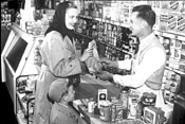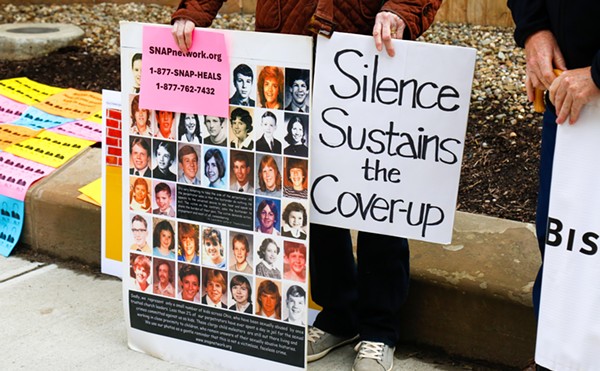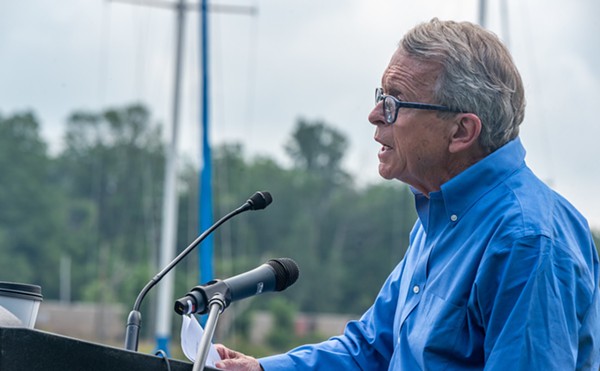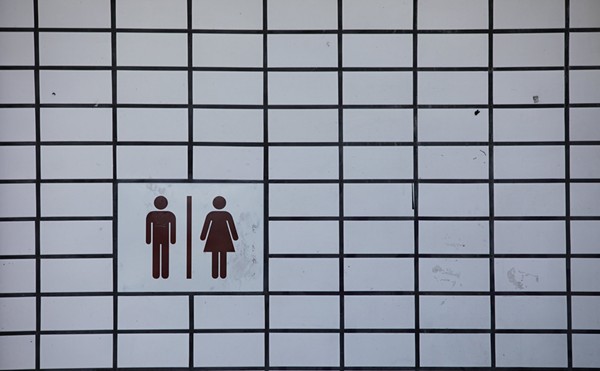One simple law governs the workplace: If you like your employer, chances are you'll take the extra step, do work that honors you both. But if you distrust him, if you believe he sees you as a resource to be used and abused, you will work against him. Revenge, after all, is a basic human need.
Consider Gabe Mazefsky in the latter camp. He is seated in a back office of the United Food & Commercial Workers building, reading from cue cards as a camera crew hovers. Mazefsky is a natural before the lens, bright and composed. The camera guys are pleased with the footage.
In a few weeks, it will be seen across Northeast Ohio on MTV, VH1, and BET. The commercial will feature Mazefsky talking to his co-workers about the virtues of unionizing. It seems his employer, Marc's Deeper Discount Stores, has made an enemy of this 24-year-old with the polite bearing and sunken eyes. It was not a wise enemy to make.
Mazefsky remembers the day he made the call. He had gone to his manager to discuss a chaotic storage room at the Marc's on Mayfield Road in South Euclid. The lack of order was impeding his work restocking the dairy department. The boss didn't want to hear about it. "He says, 'Get out of my face. Get out of this office.'"
The manager tried to make it a worker vs. worker beef, presenting Mazefsky in front of other employees and announcing, "This guy doesn't think you're doing your work."
Says Mazefsky: "That's when we called the union."
With that, employees on Mayfield Road sparked one of the biggest union drives Cleveland has seen in years.
Marc's makes an inviting target. Though its charming, Third World ambiance speaks to a downtrodden enterprise merely shuffling along, it is about to open its 50th store in Northeast Ohio. It's moved into Youngstown, and is about to take on Columbus.
It's also becoming more aggressive. In Madison, for example, it recently opened a store within a few hundred feet of Giant Eagle. And it's expanding its grocery selection to compete directly with the big boys. Marc's, it seems, has a competitive advantage.
While Heinen's, Tops, Giant Eagle, and others are union shops, Marc's decidedly isn't. Its wages and benefits, to put it charitably, most seriously blow. Which, of course, provides the ultimate trump card in an industry where profit margins are usually cut at less than 5 percent. Which, unfortunately, also attracts the attention of people you'd prefer to avoid. That would be UFCW Local 880.
With 27,000 members, Local 880 boasts economic firepower that is not to be messed with. And it has now trained its sights on some 6,000 Marc's employees. It will soon launch TV commercials about the benefits of buying union, as well as commercials that speak directly to employees. It has a compelling argument to make.
Marc's workers average about $7 an hour. Raises come randomly, often in dime increments, if at all. There's no health care for part-timers, and even those working 40-hour weeks don't necessarily qualify. "No one can tell me how to achieve full-time," says Mazefsky.
Compare this to union groceries, where the starting pay is comparable, but workers can ascend to $15 an hour, everyone gets health care, and all receive a vested pension after five years. For Marc's employees, the decision is a no-brainer.
The company clearly brought this on itself. In a heavily unionized industry, the only way to keep organizers at bay is to offer competitive benefits and treat your employees with a pound of sweetness. Marc's apparently missed this lesson.
Lou Maholic, Local 880's director of organizing, tells the story of an employee who called in sick. His supervisor wanted a doctor's excuse. "I'm making about $7 an hour," says Maholic, "and you don't provide health care. How am I supposed to get a doctor's excuse?"
Others, like Mazefsky, claim some white workers get to skip the grunt work usually dumped on new employees. "One manager -- he thought I was his boy -- he'd make racist jokes, referring to the black guys, saying they didn't do as much work." By contrast, Clarence Williams, who's black, has spent 18 months collecting carts in the parking lot. "I can't get inside the store."
Yet most complaints fall under the elusive category of "the way they treat you." There's a certain bitchiness, workers say, a certain condescension, as if their presence alone is a matter of irritation to supervisors.
Surely there's a contrary tale to be told, but Marc's isn't revealing it. Debbie List, an assistant to company President Kevin Yaugher, says management will have no comment. Yaugher, however, appears to be taking the drive seriously.
Within a week after Mazefsky was caught collecting union signatures in the breakroom, the store had a new top manager. Mazefsky was suddenly switched to days, "which I've been asking for months." Williams says formerly surly managers now inquire about his mother. "When they heard about the union," says pharmacy technician Anna Bradley, "they suddenly got real nice."
At the same time, Maholic claims management has hired a Philadelphia law firm that specializes in the ever so polite euphemism of "union-avoidance." The company is holding one-on-one meetings with employees, he says, asking workers where they stand, if they know of colleagues who are pro-union. "Everybody's afraid that they're going to lose their job before the union comes," says Bradley.
Maholic admits this makes for an uphill fight. Most of Marc's employees are young and transient, or single moms who can't afford to lose a job. "It's harder to stay and make it better than it is to quit and go on to the next place," he says.
Still, he believes it's a fight worth picking. "They're dumping off their moral responsibility on the taxpayers of Northeast Ohio. If an uninsured person gets sick, they end up going to the emergency room, and when they can't pay, insured people pick up the tab."
Or as Bradley notes: "There are some things just a little too important for me to back down."












